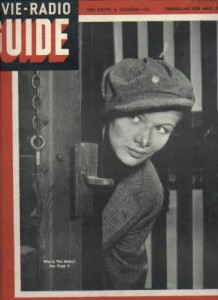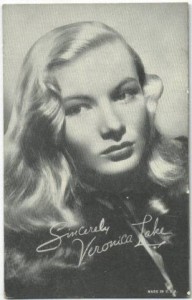
Veronica Lake in "Sullivan's Travels" Cover of a 1942 issue of Movie-Radio Guide
I love “Sullivan’s Travels,” I really do. The 1941 Paramount release from Preston Sturges starring Joel McCrea and Veronica Lake certainly has held up well over the years, growing in legend as each new generation discovers it. Perennially underrated to the point where folks like me probably tend to overrate it some, it’s often thought of as the film world’s greatest satire of itself. “Sullivan’s Travels” is packed with all brands of humor ranging from snappy wit to Sennett-esque slapstick before taking a sharp turn towards the end to squeeze in a mini-remake of “I Was a Fugitive From a Chain Gang.”
McCrea’s Sullivan is a successful film director, but saddled with a reputation for frivolous comedies sporting titles such as “Ants in Your Plants of 1939” and “Hey Hey in the Hay Loft.” But with all the misery looming over the world Sullivan has decided he wants to do bigger things, specifically, he wants to make “O Brother, Where Art Thou?” in order to, as he puts it, “realize the potentialities of film as the sociological and artistic medium that it is,” even if it has to have the compromise of, as his studio heads suggest, “a little sex in it.”

Joel McCrea on the cover of a 1938 story booklet from Italy.
When Sullivan’s bosses, played by Robert Warwick and Porter Hall, ask him what he knows about suffering and real trouble, he has no answer for them. Born of privilege and seemingly bred for this business, Sullivan is forced to admit that he has “no idea what trouble is.” But he aims to find out. He decides to make himself up as a hobo and take to the road so he can live the troubles he wishes to bring to the screen.
It takes Sullivan three tries to really find the kind of trouble he thinks he’s looking for, but he gets a little further and the tone of “Sullivan’s Travels” gets a bit darker each time he heads out. Towards the end of his first journey, highlighted by a mad chase sequence with Sullivan’s studio babysitters hot on his trail, we meet the unnamed character of “The Girl,” played by Veronica Lake, whose hair is at the height of its fame here resting in its familiar position over her right eye.
The Girl treats Sullivan to coffee and a doughnut and they trade tales of hard times. She’s giving up her attempts at Hollywood discovery to head back East, while Sullivan, not yet having any real specific tales of hardship, questions her on the terrible general state of the world, which she answers with a sneer. Lake delivers her lines mostly in a monotone purr, though she does manage to hit the right intonations when need be and is engaging throughout. Despite being more suited for her grittier Alan Ladd pairings “Sullivan’s Travels” is Veronica Lake’s best movie.
Once circumstance forces Sullivan to reveal his entire story to the Girl she insists on accompanying him on his second journey, which she does after being made up to look like Louise Brooks’ twin from “Beggars of Life”. While the other tramps don’t see through Sullivan’s cover, the pair is green enough to elicit the comment of “Amateurs” from one experienced rail-rider, who, along with his companion, is driven away when Sullivan politely asks, “How do you feel about the labor situation?”
Like Lake, “Sullivan’s Travels” is Joel McCrea’s crowning achievement, at least among non-Western appearances. Off the road he’s given the best lines while opposite Warwick and Hall’s bigwigs, while the barbs from his servants (Eric Blore and Robert Greig) come at McCrea’s expense. The give and take between McCrea and Lake is part of a believable and sweet courtship being played out under unusual circumstances. You start the movie wondering why Joel McCrea was given this part and you leave it feeling he was just right.
The third time out for Sullivan is all business. This is where Sturges drains all of the comedy out of the picture and gives us his “O Brother, Where Art Thou?” Lake’s Girl wears no make-up, both of them are outfitted in their shabbiest costumes yet, and there’s not even any dialogue as Stuges’s montage of tramp life instead plays out to music. Sullivan and the Girl step through breadlines, wash in community showers, grimace their way through a meal in a mess hall, and carve out a spot to sleep in a room filled wall to wall with the downtrodden. Sullivan even digs in deep enough to exploit himself by wearing a sandwich board for a clothing shop proclaiming “Why look like a tramp?”
Scouring garbage cans for their next meal Sullivan is finally fed up, grabs the Girl’s hand and runs away. The grand experiment is over and Sullivan has what he needs to make “O Brother, Where Art Thou?” But “Sullivan’s Travels” is only hitting the one hour mark by this time.
The film grows darker when Sullivan, out dispensing $5 bills to the poor who’d provided his inspiration, is rolled by an ornery bum who’d just happened to steal his shoes in an earlier scene. Out cold and tossed onto a train, Sullivan is disoriented when he wakes and responds to a yard bull’s taunts by … tightly grasping a stone in his fist and beating the bull on the head with it, striking at least two blows. Sturges shows us the trial through Sullivan’s own disconnected foggy state as our hero, suffering amnesia, pleads guilty to trespassing and atrocious assault and is sentenced to six years hard labor.
It’s in Sullivan’s darkest hour that he finally learns that misery doesn’t really love company. Sullivan had previously sat with a distracted crowd in a movie house playing depressing titles like “Beyond These Tears” and “The Valley of the Shadow” when on the first leg of his adventure and he later sat passively with other tramps while an animated preacher brought fire and brimstone down amongst the sedate crowd during the musical montage of tramp life. Both gatherings included entertainers, but a crowd far from entertained. But with the most miserable lot he’s yet to have been associated with, hardened criminals on a chain gang, Sullivan is exposed to the antics of Mickey Mouse which is met with hysterics by all viewers including the poor black churchgoers who have kindly shared their screen with the prisoners. Having faced nothing but misery since his incarceration Sullivan is surprised at his own laughter but also exhilarated by it.

Joel McCrea 1933 United Kingdom Tobacco "Cinema Stars" tobacco card
It’s also during the prison portion of “Sullivan’s Travels” that Sullivan utters the pretty elitist line, “They don’t sentence picture directors to a place like this for a little disagreement with the yard bull.” No, they don’t, but this sense of entitlement makes it an effort for the audience to stay connected to Sullivan, even after sharing his revelation during the cartoons. By this point of the movie we’d really like to like the guy, but our feelings for him peaked before Sturges took him on this dark turn. Anyway, Sullivan, presumed dead by those who knew him, follows his thought to a too logical resolution which springs him from prison and back into the arms of the Studio and the Girl at film’s end.
I still love “Sullivan’s Travels.” I’m willing to overlook the fact that if I, or the larger percentage of the movie watching public, were to do what Sullivan did to the yard boss we’d likely A) actually feel pretty bad about it, and B) not have the apparent out of being a big-time filmmaker, but obviously from my mention of it this did stand out as a sore spot during my most recent viewing. But if we step back and view this more as “Sturges’ Travels” than Sullivan’s it fits the puzzle a good deal better. The question is, should we have too?
So while imperfect, “Sullivan’s Travels” still retains most of its charm, even if Sullivan himself loses some of his sheen through his assault. Sturges gets a lot from the sometimes suspect talents of McCrea and Lake in his leads, but it’s his company of stock players who really elevate “Sullivan’s Travels.”
Beyond those named already such as Warwick, Hall, Blore, and Grieg, there are money lines delivered skillfully throughout by such familiar faces as Torben Meyer (the doctor), Jan Buckingham (Sullivan’s wife), Esther Howard and Almira Sessions (as sisters Ursula and Zeffie), Frank Moran (the driver – “In the valley of the shadow of adversity. It’s what you call a paraphrase.”), plus the better known Franklin Pangborn (as Mr. Casalsis) and William Demarest (as Mr. Jones).

[phpbaysidebar title=”eBay Shopping” keywords=”Veronica Lake,Joel Mccrea” num=”5″ siteid=”1″ category=”45100″ sort=”EndTimeSoonest” minprice=”49″ id=”2″]




Leave a Reply